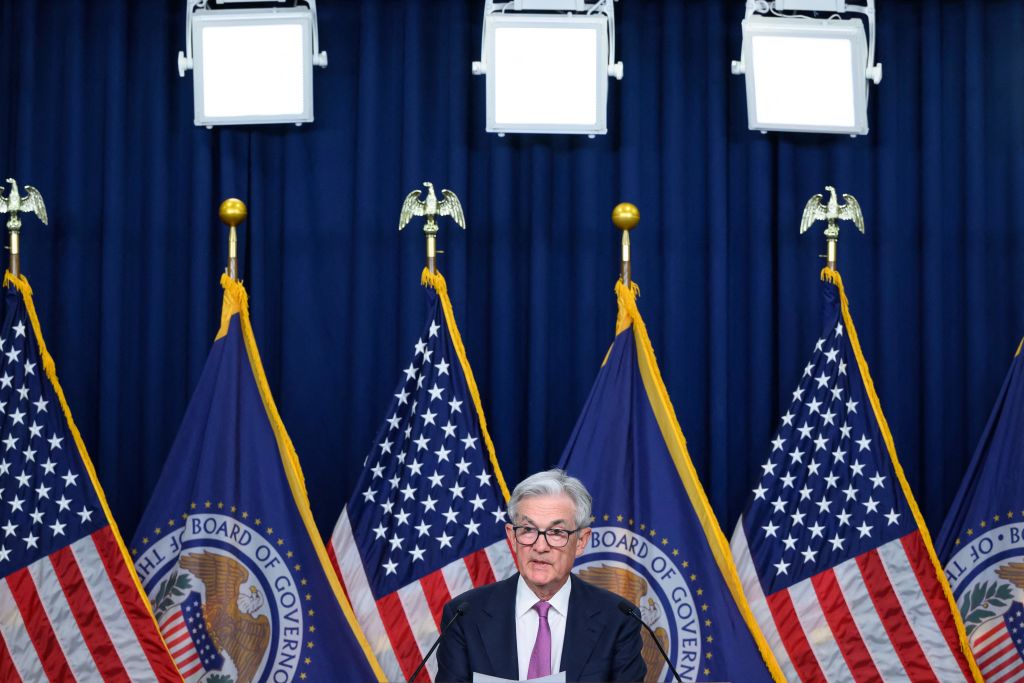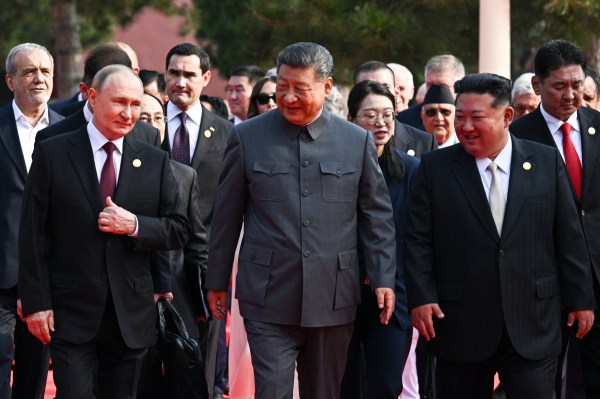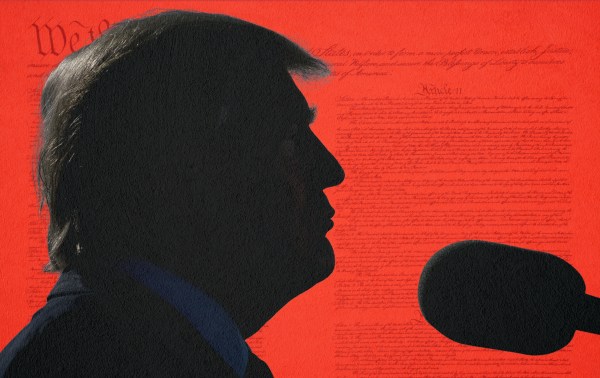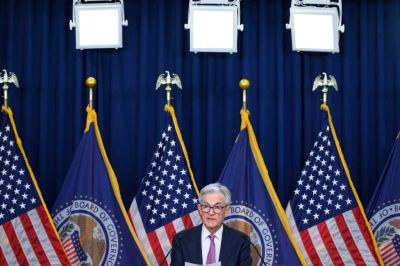Happy Thursday! A Belgian dad faked his own death and showed up to the funeral in a helicopter to teach his family “You shouldn’t wait until someone is dead to meet up with them.”
Consider this your warning to make Father’s Day plans for this weekend.
Quick Hits: Today’s Top Stories
- The Federal Reserve paused its rate hike campaign Wednesday after 10 straight increases since March 2022, leaving the federal funds rate at 5 to 5.25 percent—though Fed Chair Jerome Powell said most of the central bankers believe they’ll need to raise rates at least once more this year to tamp down lingering inflation. The Consumer Price Index rose 4 percent year-over-year in May.
- The State Department confirmed Wednesday that Secretary Antony Blinken will leave for Beijing Friday. The secretary is expected use the trip to push Chinese officials for greater military-to-military communications—which China cut off after then-House Speaker Nancy Pelosi visited Taiwan in August—amid China’s recent escalatory behavior in the South China Sea and Taiwan Strait Also this week, Microsoft co-founder Bill Gates is visiting China and will reportedly meet with Chinese leader Xi Jinping.
- Belarusian President Alexander Lukashenko said Wednesday his country has begun receiving nuclear weapons from Russia, including, he claimed, bombs “three times more powerful than Hiroshima and Nagasaki.” Russian President Vladimir Putin promised in March to deploy nuclear weapons to Belarusian soil after suspending in February Russia’s cooperation with New START, the last nuclear arms control treaty between the United States and Russia.
- Sen. James Risch of Idaho—top Republican on the Senate Foreign Relations Committee—is blocking a $735 million arms sale to Hungary in an effort to force the country to approve Sweden’s NATO membership bid ahead of the defensive alliance’s summit next month. Hungary is expected to back Sweden’s bid once Turkey does so, but Turkish President Recep Tayyip Erdoğan said this week a new Swedish anti-terror law doesn’t go far enough in cracking down on Kurdish activists to earn Ankara’s support. A new country’s ascension to the alliance requires unanimous approval from existing members.
- A Manhattan grand jury has voted to indict Daniel Penny, the former Marine who choked Jordan Neely to death on a New York City subway, on charges of second-degree manslaughter. The expected procedural step allows Penny’s trial to proceed.
- The European Commission charged Google Wednesday with breaking European Union antitrust rules by illegally buying ad tech competitors and manipulating online advertising auctions to favor its own services—Google’s fourth European antitrust charge. The United States Department of Justice brought similar charges against the tech giant in January, requesting a breakup of Google’s ad business.
- Miami Mayor Francis X. Suarez filed Wednesday to run for the Republican presidential nomination in 2024. A Cuban American serving his second mayoral term, Suarez is an underdog in the race who may struggle to meet fundraising levels required to attend the first primary debate.
A Pregnant Pause

Nobody can blame Federal Reserve Chair Jerome Powell’s music taste for contributing to inflation. Instead of singing along to Beyoncé—prices for hotel rooms near her tour kickoff were so high they’ve been blamed for Swedish inflation—or dropping $21,000 on a Taylor Swift Eras Tour ticket, Powell indulged a cost-effective taste for rock music, attending a recent Dead and Company show where tickets could be bought for less than $100.
Back on the clock at his day job, Powell and his panel of central bankers fulfilled financial analysts’ expectations yesterday by announcing a pause in their rate-hiking campaign. But rates remain elevated, and the central bank suggested further increases may be necessary later in the year.
On Wednesday, the Federal Open Market Committee (FOMC) voted unanimously to keep the federal funds rate at the current target range of between 5 and 5.25 percent—the level set at its May meeting after a 25-basis-point hike. Before yesterday’s vote, the Fed had raised rates 10 consecutive times. The central bank rapidly brought the rate up—often in hefty 75-basis-point increments—from a target range of 0 to 0.25 percent in February 2022, when inflation was at 7.9 percent year-over-year.
By Wednesday, financial observers largely expected the Fed to take a breather, citing easing inflation and the need to avoid more banking sector upheaval. In recent months, three large banks have collapsed amid financial woes exacerbated by high interest rates. The Fed this week opted for a wait-and-see approach. “In light of how far we’ve come in tightening policy, the uncertain lags with which monetary policy affects the economy, and potential headwinds from credit tightening, today we decided to leave our policy interest rate unchanged,” Powell said at a press conference following the committee vote. “I would almost say that the conditions that we need to see in place to get inflation down are coming into place,” he added. The pause allows the FOMC more time “to assess additional information and its implications.”
The pause doesn't mean the Fed is satisfied with our inflation numbers. The core consumer price index—a metric that excludes volatile food and energy prices for a clearer picture of inflation trends—has remained stubbornly elevated over the last six months, hovering around 5.5 percent year-over-year. While overall inflation fell to 4 percent year-over-year in May—the lowest level in two years—core inflation stayed at 5.3 percent. “If you look at the full range of inflation data, particularly the core data, you just aren’t seeing a lot of progress over the last year,” Powell explained. The Fed’s 2 percent inflation benchmark is measured by Personal Consumption Expenditures (PCE), and the central bank’s updated Summary of Economic Projections reflected a gloomier PCE outlook, predicting 2023 PCE inflation to be higher—3.9 percent—than its previous March estimate of 3.6 percent.
That’s why, despite the pause, the committee made clear future rate hikes are on the horizon this year. The Fed now predicts interest rates will end the year at 5.5 to 5.75 percent, suggesting two more 25 basis point hikes. “Nearly all committee participants view it as likely that some further rate increases will be appropriate this year to bring inflation down to 2 percent over time,” Powell said yesterday.
If this stop-and-go plan strikes you as odd, you’re not crazy, and some analysts criticized the Fed’s framing of its pause. “The statement wasn’t very clear, and Powell was sending two very different messages,” argued Charles Plosser, former president of the Philadelphia Fed. “This is just a really bad signaling and allows people to read too much of what they want to hear.” Some analysts have even dubbed the move a “hawkish pause.” A large part of the Fed’s job is managing expectations for what it’s going to do in the future, and the markets don’t always take the central bank at its word—which could apply to the threat of future hikes. “Odds are that this is a bluff as inflation is going to continue to weaken in the second half of this year and into next,” said Ryan Sweet, chief U.S. economist at Oxford Economics.
The Fed’s projections did include some good news. The 2023 gross domestic product (GDP) growth forecast was revised up from 0.4 to 1 percent, and the projected unemployment rate was revised down from 4.5 to 4.1 percent. Meanwhile, GDP grew by 1.3 percent during the first quarter of the year and the unemployment rate sits at 3.7 percent. A growing economy and strong labor market won’t necessarily reduce inflation, but they are two factors that increase the likelihood of a so-called soft landing—inflation brought under control without triggering a recession.
When we wrote to you last month on the state of the economy, some analysts had begun to argue that the long-predicted recession might not materialize, since—in the face of successive rate increases—the economic indicators remained relatively robust. That narrative has strengthened in recent weeks. “The previous set of Fed forecasts—these are numbers so they don’t speak clearly—but they effectively said ‘we expect a recession,’” Justin Wolfers, a professor of economics at the University of Michigan, tells TMD. “The latest set of Fed forecasts said ‘we expect a soft landing.’”
“There’s been a fairly dramatic shift away from recession talk,” he added.
This is no doubt gratifying to Powell, who has maintained for months that a soft landing is possible. With the numbers now supporting him, he reiterated the point yesterday. “There is a path to getting inflation back down to 2 percent without having to see the kind of sharp downturn and large losses of employment that we’ve seen in so many past instances,” Powell said.
As ever, shifting economic conditions could ruin Powell’s best-laid plans, so we'll see in July whether inflation and unemployment data convince the Fed to hike rates again or keep the pause. When asked whether rates will go up next month, Powell said, “We didn’t make any decision.”
“I will say the July meeting will be live,” he added. “We’ll just have to see.”
The GOP’s Trump Choice
This morning, The Dispatch editors published our third ever editorial—on Donald Trump, the historic federal indictment of the former president, and the 2024 GOP presidential nomination.
Donald Trump was arraigned in federal court Tuesday. The 37 counts he is charged with were detailed in a devastating 49-page indictment released late last week. The former president is accused of keeping highly classified documents after his presidency ended and thwarting the efforts of federal investigators to have them safely returned. The evidence is compelling and overwhelming. While Trump deserves a proper defense, no serious person who has read the indictment and lived through the last eight years believes he is innocent.
There are many reasons to believe he will be—and ought to be—a convicted felon. And if current polling holds, he will also be the 2024 Republican presidential nominee. It’s a thoroughly depressing prospect.
We say that not as supporters of Joe Biden or his party. To the contrary, we believe Biden has been a bad president, too often beholden to the far left and too willing to break promises he made to be a unifying leader. He has pandered to progressives on fiscal and cultural issues, cast good-faith opponents of his voting rights policies as Jim-Crow-era racists, and portrayed critics of his profligate spending as nihilistic radicals. The questions about his mental acuity—raised by Democrats and Republicans alike—come from his age (80) and his public appearances. His vice president, Kamala Harris, is by all accounts even more progressive and more divisive. Four more years of Joe Biden as president would be bad for the country.
Donald Trump as the Republican nominee makes a second term for Joe Biden likely. Most elected Republicans understand this and, in the comfort of private conversation, not only acknowledge this reality but offer withering critiques of Trump and his behavior that they strain to avoid making in public.
With all the humility we can muster about the likelihood they’ll listen to us, we implore them: Say in public those things about Donald Trump that you so often say in private. And start with the latest indictment.
The offenses detailed in the indictment are serious. Trump took from the White House hundreds of sensitive documents at the end of his term. Some were classified at the highest levels—records related to U.S. nuclear programs and potential American weaknesses, war plans with Iran, foreign and domestic weapons capabilities, among others. Many were haphazardly stored in boxes around the Mar-a-Lago resort, a poorly secured magnet for foreign spies.
The National Archives asked Trump, repeatedly and in good faith, to return these materials. He ignored some of these requests and rejected others. He played games with the FBI, enlisting his aides to hide boxes from investigators and insisting that his lawyers lie on his behalf. A transcript of an interview with Trump from July 2021 appears to show the former president presenting a highly classified document to visitors without clearances to see it—and acknowledging that he didn’t have declassification authority.
“As president I could have declassified it,” Trump said. “Now I can’t, you know, but this is still a secret.” He added, “Isn’t that interesting?”
It is interesting—and illegal. An enlisted soldier or midlevel CIA bureaucrat who’d done the same would be on his way to jail.
The documents that Trump took are “among the most sensitive secrets that the country has,” said Bill Barr, Trump’s attorney general, in an interview over the weekend. “If even half of it is true, then he’s toast,” Barr added. “It’s a very detailed indictment and it’s very damning.”
We’re sympathetic to concerns from those who worry about double standards. Republicans who protest that Trump is being prosecuted by the same Justice Department that let Hillary Clinton off the hook over her own classified-documents scandal have a point. Clinton was “extremely careless”—in then-FBI Director James Comey’s phrasing—with the handling of top-secret materials when she hosted them on a private email server in her New York home as secretary of state. Comey’s decision not to recommend charges for Clinton was deeply controversial at the time; we think she should have been prosecuted. These facts make Clinton’s recent self-satisfied victory lap—she used the news of Trump’s indictment to hawk “But Her Emails” merch on Twitter—a disgraceful reminder of why she was weak enough to lose to Trump.
If Trump’s alleged conduct were equivalent to Clinton’s, that wouldn’t necessarily mean Trump’s indictment was wrong. The answer to partisan double standards isn’t to abandon standards altogether; it’s to insist on the nonpartisan application of them. This is especially true when the standard under discussion is the rule of law.
But this is beside the point. The conduct of Trump and Clinton is not equivalent. Trump is charged not only with mishandling highly classified materials, but with executing a shockingly clumsy scheme to avoid handing them back to the government (and lying to cover his tracks). Trump’s intent to deceive shines out from the indictment like a fog light. And the fact that he has insisted—before the indictment and after—he is allowed to have the materials he took is effectively an admission of guilt.
We’ve been encouraged by the emergence of a Republican “sanity caucus.” Among Trump’s primary opponents, former Gov. Chris Christie has been forthright in calling Trump’s actions leading to the indictment “inexcusable.” Former Vice President Mike Pence has said he “cannot defend what is alleged.” On Capitol Hill, Sen. Mitt Romney correctly said Trump “brought these charges upon himself,” and has been joined by Sens. John Thune, John Cornyn, and Lisa Murkowski in expressing concern about the underlying alleged crime. Rep. Dan Crenshaw, a former Navy SEAL, said: “It’s very problematic. There’s a reason I’m not—not defending it.” There are other Republicans willing to speak the truth, but nowhere near enough.
It’s a cliche to say the definition of insanity is doing the same thing over and over and expecting a different result. But in that spirit, let’s say this: Sticking with Trump? It’s insanity.
Worth Your Time
- In early May, Russian draftee Ruslin Anitin stood alone and wounded in a trench, a shovel and water bottle in the dirt at his feet, looking into the camera of the Ukrainian drone targeting him. He clasped his hands in a silent plea—don’t kill me, I surrender. “His face was beamed onto a screen at a command post of Ukraine’s 92nd Mechanized Brigade a few miles away, near the eastern city of Bakhmut,” reporters write for the Wall Street Journal. “Col. Pavlo Fedosenko conferred with other officers, then sent an order over the radio to the drone pilots. Try to take him alive.” Drone footage shows what happened next: After receiving instructions in a dropped note, Anitin followed the drone through no man’s land—dodging Russian bombardment—to surrender into Ukrainian custody. “Less than a week later, advancing Ukrainian forces captured the trench where Anitin’s ordeal began. By then, he was sharing a cell at a detention facility in the Kharkiv region with three other captured recruits.”
- The more tiny satellites we put in the sky, the more often Hubble and earth-bound telescopes catch them in their photos—slowing research by skewing the data and making it more difficult to accurately spot objects like near-Earth asteroids. Astronomers have built workarounds, such as a computer program to identify and eliminate streaks and reflections. But they anticipate the problem worsening as more satellites flood the sky—SpaceX alone plans to go from 4,000 to 42,000 satellites. “SpaceX and some other companies have tested possible solutions, like covering a satellite with a thin film to darken it so it reflects less light, or adding a visor to reflect light away from Earth,” Ramin Skibba reports for WIRED. “These limited efforts have fallen far short of the International Astronomical Union’s brightness targets, and some of these designs have caused problems for the satellites themselves, by heating them too much or interfering with inter-satellite communication.”
Presented Without Comment
Bloomberg: Hong Kong Protest Song Unavailable on iTunes After Government Seeks Ban
Also Presented Without Comment
BBC: Harvard morgue manager charged with selling body parts
Also Also Presented Without Comment
Axios: The White House will continue to use the term “MAGA” a week after the independent Office of Special Counsel (OSC) declared that doing so is a violation of the Hatch Act.
Toeing the Company Line
- In the newsletters: Jonah argues (🔒) not everything should be democratized, Scott pleads (🔒) with everyone to drop the toddler economics, Nick unpacks (🔒) the difficulty of capitalizing on Trump’s indictment, and the Dispatch Politics team reports on why Trump’s Republican rivals aren’t taking swings at him over the charges.
- On the podcasts: Sarah and David discuss the Cannon conundrum and Trump’s possible defense on an indictment edition of Advisory Opinions, and AEI senior fellow Rick Hess joins Jonah on The Remnant to discuss options for a post-pandemic education overhaul.
- On the site: Harvest previews an immigration case before the Supreme Court, Drucker reports on the Republican National Committee’s new strategy going into 2024, and Charlotte looks at how Ukraine’s counteroffensive performance might boost or blunt its support from GOP lawmakers.
Let Us Know
Has inflation slipped off your radar as it has eased, or are you still feeling the pinch in your wallet?








Please note that we at The Dispatch hold ourselves, our work, and our commenters to a higher standard than other places on the internet. We welcome comments that foster genuine debate or discussion—including comments critical of us or our work—but responses that include ad hominem attacks on fellow Dispatch members or are intended to stoke fear and anger may be moderated.
With your membership, you only have the ability to comment on The Morning Dispatch articles. Consider upgrading to join the conversation everywhere.